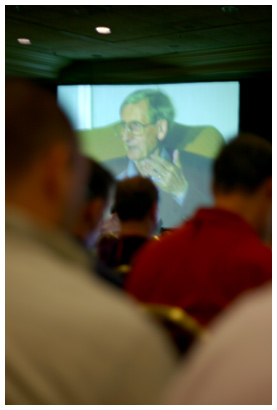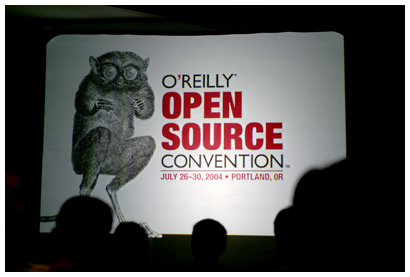OSCON Wednesday 2
Just for some OSCON closure...I enjoyed the rest of the day. Michael's talk convinced me that I should be looking into this whole "Ruby on Rails" thing, it's impressive what he's put together (llor.nu, unroll backwards) with Rails and Scriptaculous. He mentioned that he barely knew JavaScript, but was able to put together the highly interactive interface for the game thanks to existing libraries.
I saw a demo of the Google Ajax Search API, and got a better feel for that. It's definitely buzzword compliant, but I'm not convinced it improves over the standard Google API beyond the perceived response time. I personally wish Google would put as much effort into expanding their existing Search APIs, rather than delivering the same data in a new, souped-up way.
The rest of the day I was on the "Six Apart" track. Artur Bergman lead a session about 6A's infrastructure. Lots of talk about load-balancing, caching, and managing servers ensued. Then 6A-er Tatsuhiko Miyagawa demoed his project Plagger—an RSS/Atom slicer and dicer. It does a ton of cool stuff, but it looks hard to install. I need to play around with it.
I didn't make it to the community sessions I was talking about, but I had fun peering into windows on tech worlds outside of my normal experience.
I saw a demo of the Google Ajax Search API, and got a better feel for that. It's definitely buzzword compliant, but I'm not convinced it improves over the standard Google API beyond the perceived response time. I personally wish Google would put as much effort into expanding their existing Search APIs, rather than delivering the same data in a new, souped-up way.
The rest of the day I was on the "Six Apart" track. Artur Bergman lead a session about 6A's infrastructure. Lots of talk about load-balancing, caching, and managing servers ensued. Then 6A-er Tatsuhiko Miyagawa demoed his project Plagger—an RSS/Atom slicer and dicer. It does a ton of cool stuff, but it looks hard to install. I need to play around with it.
I didn't make it to the community sessions I was talking about, but I had fun peering into windows on tech worlds outside of my normal experience.

